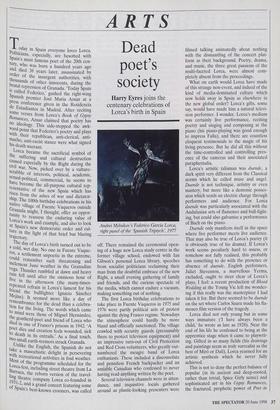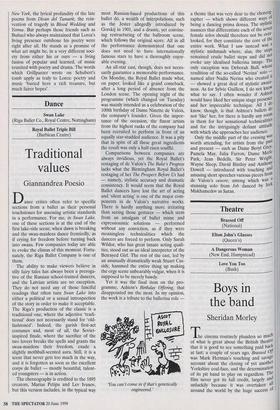ARTS
Dead poet's society
Harry Eyres joins the centenary celebrations of Lorca's birth in Spain Today in Spain everyone loves Lorca. Politicians, especially, are besotted with Spain's most famous poet of the 20th cen- tury, who was born a hundred years ago and died 38 years later, assassinated by order of the insurgent authorities, with thousands of other innocents, during the brutal repression of Granada. 'Today Spain is called Federico,' gushed the right-wing Spanish premier Jose Maria Aznar at a press conference given in the Residencia de Estudiantes in Madrid. After reciting some verses from Lorca's Book of Gypsy Romances, Aznar claimed that poetry has no ideology. This side-stepped the awk- ward point that Federico's poetry and plays with their republican, anti-clerical, anti- macho, anti-racist stance were what signed his death warrant. Lorca became the sacrificial symbol of the suffering and cultural destruction caused especially by the Right during the Mil war. Now, picked over by a vulture- scrabble of interests, political, academic, sexual-political, commercial, he seems to have become the all-purpose cultural rep- resentative of the new Spain which has risen from the ashes of war and dictator- ship. The 100th birthday celebrations in his native village of Fuente Vaqueros outside Granada might, I thought, offer an oppor- tunity to reassess the enduring value of Lorca's work and example, and also to look at Spain's new democratic order and cul- ture in the light of that brief but blazing trajectory. The day of Lorca's birth turned out to be a cold, wet day. No one in Fuente Vaque- ros, a settlement unpoetic in the extreme, e. ould remember such threatening and Inclement June weather in the Granadine Vega- Thunder rumbled at dawn and heavy rain fell until after the ominous hour of five in the afternoon (the many-times- repeated refrain in Lorca's lament for his friend the bullfighter Ignacio Sanchez Meilas). It seemed more like a day of remembrance for the dead than a celebra- tion for the living. The words which came to mind were those of Miguel Hernandez, the goatherd-poet and friend of Lorca who died in one of Franco's prisons in 1942: "A poet dies and creation feels wounded, sick to death in its entrails.' As a final touch, two small earth-tremors struck Granada. Unlike the English, the Spanish do not take a masochistic delight in persevering with recreational activities in foul weather. Most of the programme scheduled for the Lorca-fest, including street theatre from La B. arraca, the reborn version of the travel- ling theatre company Lorca co-founded in 1931-2, and a grand concert featuring some of Spain's best-known crooners, was called Andrei Mylnikov's Federico Garcia Lorca, right panel of the 'Spanish Triptych 1977 off. There remained the ceremonial open- ing of a huge new Lorca study centre in the former village school, endowed with Ian Gibson's personal Lorca library, speeches from socialist politicians reclaiming their man from the doubtful embrace of the new Right, a small evening gathering of family and friends, and the curious spectacle of the media, which cannot endure a vacuum, making something out of nothing.
The first Lorca birthday celebrations to take place in Fuente Vaqueros in 1975 and 1976 were partly political acts of protest against the dying Franco regime. Nowadays the atmosphere could hardly be more bland and officially sanctioned. The village crawled with security guards (presumably there to protect television equipment) and an impressive turn-out of Civil Protection and Red Cross volunteers, who greatly out- numbered the meagre band of Lorca enthusiasts. These included a disconsolate and penniless French backpacker and an amiable Canadian who confessed to never having read anything written by the poet. Several television channels were in atten- dance, and inquisitive locals gathered around as plastic-looking presenters were filmed talking animatedly about nothing with the dismantling of the concert plat- form as their background. Poetry, drama, and music, the three great passions of the multi-faceted Lorca, were almost com- pletely absent from the proceedings. What on earth would Lorca have made of this strange non-event, and indeed of the kind of media-dominated culture which now holds sway in Spain as elsewhere in the new global order? Lorca's gifts, some say, would have made him a natural televi- sion performer. I wonder. Lorca's medium was certainly live performance, reciting poetry and singing and composing at the piano (his piano-playing was good enough to impress Falla), and there are countless eloquent testimonials to the magic of his living presence. But he did all this without the time-controlled and controlling pres- ence of the cameras and their associated paraphernalia. Lorca's artistic talisman was duende, a dark spirit very different from the Classical norms which he called muse and angel. Duende is not technique, artistry or even mastery, but more like a demonic posses- sion which sends an electric charge through performers and audience. For Lorca duende was particularly associated with the Andalusian arts of flamenco and bull-fight- ing, but could also galvanise a performance of Bach on the piano.
Duende only manifests itself in the space where live performer meets live audience. That may also be true of Lorca's poetry (it is obviously true of his drama). If Lorca's work seems peculiarly hard to assess, or somehow not fully realised, this probably has something to do with the presence or absence of duende. English performers, Juliet Stevenson, a marvellous Yerma, excluded, ought to steer clear of Lorca's plays, I feel: a recent production of Blood Wedding at the Young Vic left me wonder- ing if this really was the masterpiece I had taken it for. But there seemed to be duende on the set where Carlos Saura made his fla- menco film version of the tragedy.
Lorca died not only young but in some ways immature CI have always been a child,' he wrote as late as 1928). Near the end of his life he confessed to being at the apprentice stage when it came to playwrit- ing. Gifted in so many fields (his drawings and paintings seem as truly surrealist as the best of Mir6 or Dali), Lorca yearned for an artistic synthesis which he never fully achieved.
This is not to deny the perfect balance of popular (in its ancient and deep-rooted, rather than trivial, Spice Girly sense) and sophisticated art in his Gypsy Romances, the fractured, prophetic power of Poet in New York, the lyrical profundity of the late poems from Divan del Tamarit, the rein- vention of tragedy in Blood Wedding and Yerrna. But perhaps those friends such as Bufmel who always maintained that Lorca's living presence outshone his poetry were right after all. He stands as a promise of what art might be, in a very different soci- ety from either his or ours — a living fusion of popular and learned, of music reunited with poetry and drama. The words which Grillparzer wrote on Schubert's tomb apply as truly to Lorca: poetry and music 'buried here a rich treasure, but much fairer hopes'.



























































 Previous page
Previous page